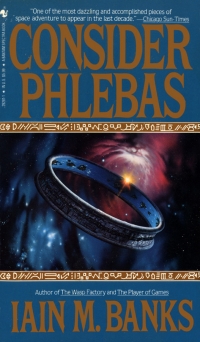Iain M. Banks, Consider Phlebas
reviewed by Danielle L. Parker

Consider Phlebas Publisher: Orbit, 1987 Trade paperback $12.99 Length: 527 pages ISBN: 978-0-316-00538-8 |
Don’t, as I did, finish Bank’s Consider Phlebas just before bedtime. The story is not conducive to rest. Not to mention everyone, except a couple minor characters, dies a gory death, so you won’t go to bed happy. The book’s got a train wreck in it (I speak literally), and it is, more or less, a lengthy, prolonged train wreck of a story.
Horza, the shape-changing humanoid assassin used by the alien Idirans against the mostly human/A. I. Culture, careens from one tooth-and-nail struggle to the next. The anti-hero’s on the side of the bad guys, but to give Banks due credit, he made me care enough about his villain to keep reading. At 500+ pages and late at night, that was quite an accomplishment. Of course I said there’s a real train wreck at the end, so don’t get too attached to any of the characters.
One of the Culture’s fabulous A. I. Minds has taken refuge after a battle on an alien world protected by a super-advanced non-corporeal species. These particular aliens aren’t involved in the Human-Idiran war, but neither combatant particularly wants to tick them off.
But the chance to grab a Culture Mind is too much temptation for the Idirans. Horza is dispatched, runs into serious difficulties, spends most of the story blasting right and left en route, and finally gets to his target to find out the Idirans sent in a team already, and the fanatic A team on the spot wasn’t told Horza was their ally.
You can read this book purely for the bam, slam, bash, crash, and explosions, which Banks does a fine job with, for the most part. It’s easy to sneer at adventure action but hard to write it well: I should know, I’ve tried. And Banks manages to keep Horza a real character during the joyride. Not many writers could do that.
There’s some deeper stuff in here for those who catch their breath enough to pay attention. The Idiruns resemble, to a wincing degree, Islam at the height of its militaristic, religion-fueled expansion.
The Culture, on the other hand, too much resembles touchy-feely, pleasure-seeking, self-actualizing, American melting-pot inclusiveness (without religion, which is simply considered ridiculous. Banks doesn’t miss a chance to make that point). Oh wow, somebody admires us. Baptists, Pentecostals, and Catholics removed, that is.
A few aspects of this story irritated me exceedingly. The egregious incident with the repellent cannibal, self-made god of his little island and his starving sick slaves, was the worst. This trumped-up gory digression hit us once again with Banks’ religion-is-nuts theme. (We got that point already, thanks). Nor was I fond of the ending. Be warned: some of you will chuck the book across the room.
The best advice is to enjoy the ride. What a wild ride it is! You’ll be out of breath trying to keep up. Just skip the cannibal and enjoy the explosions.
Copyright © 2009 by Danielle L. Parker

